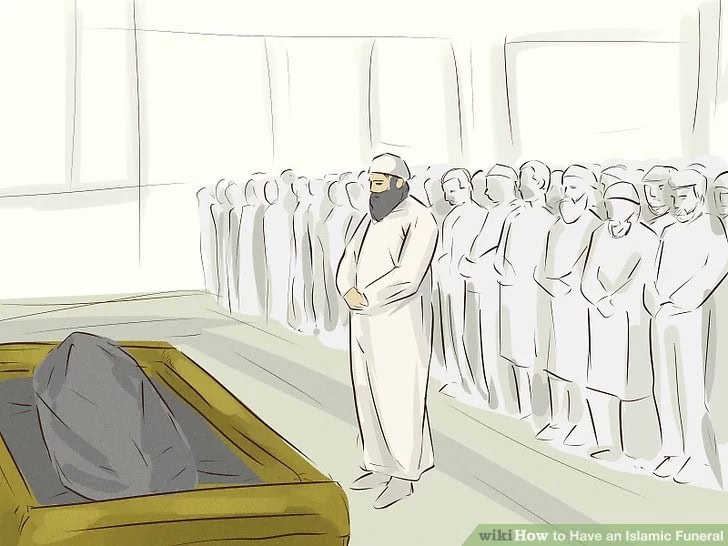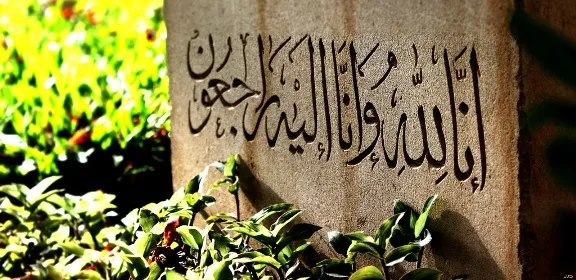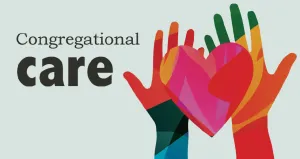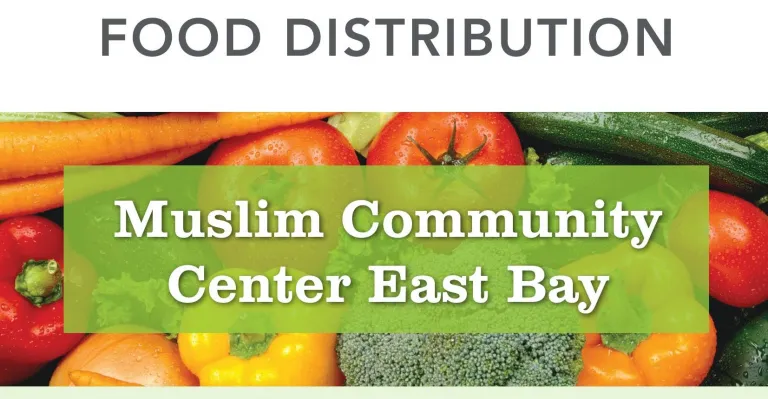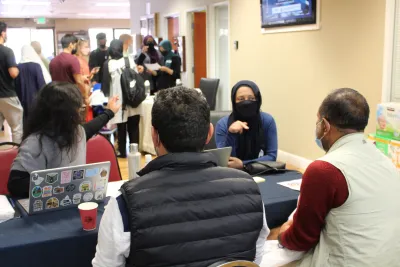MCC does not provide its own funeral services. Our services to the community are:
- help cover the burial cost of indigent Muslims in the Bay Area and;
- send out death/Janazah community announcements, and;
- encourage community members to join the funeral cooperative called the Muslim Funeral Service.
For deaths in the San Francisco Bay Area, we recommend contacting one of the two local mosques mentioned below for funeral arrangements. For the burial of a miscarried fetus, please see here.
Deaths in the East Bay
Funeral Arrangements by ISEB
The Islamic Society of East Bay (ISEB) in Fremont has contracted with Khan Funeral Home in Lodi to provide the following:
- Arrange for the removal of the deceased.
- Transport the deceased to the Mosque.
- Obtain the required legal documents to allow for the burial of the deceased.
- Transport the deceased to the final resting place.
- Provide a death certificate.
- For unnatural death, work with the local coroner’s office and;
- Embalm in unusual cases.
To request a hearse to retrieve the body of the deceased, please download the Khan Funeral Home App on the App Store (iPhones) or Google Play Store (Android phones).
For any questions or details about the funeral process and the body washing process (or to volunteer to help perform ghusl on bodies in the East Bay), please get in touch with these individuals at ISEB:
- Imam Siraj Desai at (510) 943-9600
- Brother Abdur Rehman at (510) 366-5205
- Sister Rehana Markar at (510) 683-9701
Here is the funeral paperwork.
For questions about burial at Five Pillars Muslim Cemetery, please contact:
- Syeda Reshma Inamdar at (341) 465-7302 or via email at fivepillarscemetery@gmail.com
- Omar Latif at (341) 465-7690 or via email at omar.fpfc@gmail.com
Deaths in South Bay
Funeral Arrangements By MCA
The Muslim Community Association in Santa Clara provides complete Islamic funeral arrangements, including:
- Obtaining a death certificate and burial permit;
- arrangements for storing a body;
- ghusl (washing) before burial & Janaza (funeral) prayer, and
- acquiring a burial plot at various cemeteries & transportation to the burial ground.
Only one phone call is required to start the process.
Contact Adel Elkadi (408) 709-4586 funeral@mcabayarea.org
- Estimated Costs · Plot $1,300 (paid to MCA).
- Ghusl, shrouding (kafan) and casket, and arranging for congregational funeral prayer for $1,200 (paid to MCA).
- Burial permits/paperwork & transportation $1,595 (paid to the funeral home).
- Grave opening and closure: $1,500 (paid to the cemetery).
In the event of a Muslim’s death in the San Francisco Bay Area, please get in touch with Imam Siraj Desai at (510) 943-9600. Imam Siraj is affiliated with the Islamic Society of East Bay (ISEB), which provides funeral services and arrangements in the East Bay.
For Shi’a funeral services, please get in touch with the Shia Association of the Bay Area. For deaths within the Peninsula, please see here, contact Ezzeldin (Dean) at yaseengarden@yaseen.org or (650) 867-6099. For headstone engraving, please get in touch with Brother Samay at (510) 708-7254 or info@rumistone.net.
A fetus is miscarried when some of its parts are discernible (e.g., a finger, nail, hair, etc., regardless of whether its formation is complete or not): the fetus must be named, washed, wrapped in a cloth, and buried. However, the Janazah prayer was not performed. See here and here.
Please choose only one family member or friend to coordinate with Imam Siraj for the transport and storage of the body, Islamic rites of washing the body, and Janazah/burial. Please do not let multiple family members coordinate the arrangements to avoid confusion.
The MCC East Bay does not have its own mortuary services. We provide only advice to families needing direction for burial and financial assistance for the funeral and burial of indigent Muslims in the Bay Area. The Burial Assistance application is here.
Questions? Aminah Abdullah at (925) 264-9297 or burial@mcceastbay.org.
For condolence receptions and Qur’an Khatams, please see our facility rental page.
MCC INDIGENT MUSLIM BURIAL FUND
When MCC covers the funeral/burial cost, we work closely with the (ISEB), which has a body storage facility and a team of male and female volunteers to perform the washing (ghusl) and we also arrange a burial at the Five Pillars Farm Cemetery in Livermore, CA. The ISEB and Five Pillars Farms are separate entities from the MCC.
INSTRUCTIONS: FOR THE FUNERAL AT ISEB AND BURIAL AT FIVE PILLARS CEMETERY
The ISEB has contracted with Duggan’s Funeral Service to provide the following:
- Arrange for the removal of the deceased
- Transport the deceased to the Mosque
- Obtain the required legal documents to allow for the burial of the deceased
- Transport the deceased to the final resting place
- Provide a death certificate
- For unnatural death, work with the local coroner’s office
- Embalm in an unusual case
For any questions or details about the funeral process and the body washing process (or to volunteer to help perform ghusl on bodies in the East Bay), please visit this page or contact these individuals at ISEB:
- Imam Siraj Desai at (510) 943 9600
- Brother Abdur Rehman at (510) 366 5205
- Sister Rehana Markar at (510) 683 9701
Here are other individuals:
- Omar Latif (Five Pillars Farm) at (341) 465-7690 or Reshma Inamdar at (341) 465-7302 (COVID-19 updated guidelines)
- Abdel Elkadi (Muslim Community Association (MCA) at (408) 794-9440
The cost for an adult burial in the Bay Area is about $7,500:
- Hearse transport within the Bay Area (based on mileage to retrieve the body) to bring the body to ISEB and later to Five Pillars Cemetery, a burial permit, and a death certificate: $1,800 – $2,500 (Khan Funeral Home)
- Body storage in a cold room, washing and shrouding the body, and performing the Islamic last rites (Salat al-Janazah): $500.00 (Islamic Society of East Bay)
- Adult plot purchase and opening/closing grave plot: $4,900 (Five Pillars Cemetery)
Resources
- MCC’s Islamic End-of-Life Talks Playlist
- Khan Funeral Home App (App Store & Google Play Store)
- Islamic Will & Trust Templates: Version 1, Version 2, Version 3, Version 4
- How to Wash & Shroud a Dead Body in Islam (Featuring Actors as Bodies)
- A Guide for the Muslim Funeral
- Practical Ghusl and Shrouding
- Suicide Postvention Resources List
- Islamic Estate Planning (video presentation)
- The Islamic Perspective on End-of-Life Care (video presentation)
- The Soul’s Journey After Death | Shaykh Alaeddin El Bakri
- Noor Islamic & Cultural Community Center (NICCC) in Concord – Islamic Mortuary
Can a woman see a man’s body after the ghussul?
Yes, only mahram women can see the man’s deceased body. An example of a mahram is a wife, daughter, sister, mother, and niece.
- Is there a maximum or minimum number of sisters who can perform the ghusul (washing)?
No, there is no such thing as maximum or minimum requirements, but ISEB management has rules to have only five family members and four experienced women from ISEB, in which one would be a new trainee. They have four participants from ISEB because the body is kept in the freezer, and the body may be heavy, and they need to lift the body if they are not using the machine. Most of the family members that come are in grief and mourning and cannot always lift the body. They usually can do the ghusl, but emotionally lifting may be too difficult. Also, the room is too small according to the radius. - How do you get release of the body to transport it in a family car?
ISEB has no knowledge or information regarding transporting family members in a family car. - Why do we have to throw away all the clothes? Why can we not take it as a memory?
California law does not allow you to take clothes home. All clothes worn must be disposed of in a hazardous waste bag. - Does a body need to be picked up by only mahram men from the freezer?
No, before the ghussul any man can pick up the body from the freezer and put it on the table. - Why do we bury women deeper in the grave than men?
This is not true. Men and women are buried at the same depth. - If no mahram will put the body in the grave?
This will be most pious person or other family members. - Is the Ghussul only done through organizations or can we do it at home?
ISEB has no input with regard to ghussul’s being done at home. However, Ghussul’s can be done at home if proper arrangements are made. They should contact the state and city requirements to find out more information. - Does the family provide the kafan or pay the masjid for it?
ISEB provides the kafan and all necessary items for the ghussul. - Can a woman on her period perform the ghussul of her dead relative?
No. - What is the width of the lifafa?150cm/180cm to cover from head to toe. This measurement is used in Taleem-al-Haqq, but I use 120 cm width.
- Where is the cemetery?
There is a Muslim cemetery in Livermore – at 1761 Laughlin Road. It is called the Five Pillars Cemetery. There is also a cemetery in Hayward called The Chapel of Chimes, with a Muslim area. These are the primary two used in East Bay.
Out of the immediate Bay Area, another popular and affordable resting place for Muslims in Northern California is the Islamic Cemetery of North California in Lodi. Their phone number is (209) 607-8915.
- We heard that no scissors should be used for the kaffan?
Sewed material cannot be used, but we have to cut the kaffan with scissors. - What is the Dua when closing the eyes of the deceased?
- Will the deceased feel cold water if warm is unavailable (i.e., washing in secular mortuaries)?
Faatawa Shaamiyah states that when bathing the deceased, water should not be too hot as the mayyit also feels pain and is harmed just as the living. As concerning hearing, many Ahaadith conform to this, but it should be understood that Allah grants permission for the deceased to hear what Allah wishes, i.e., a person cannot hear of his own free will. - I heard the family should stay a little after the burial. Is this true, and why?
It is advisable to remain behind after burying the deceased in the grave to occupy oneself in making zikr and supplicating for the deceased. It is permissible to supplicate by the grave while either standing or sitting.It is reported by Uthman (ra): When Nabi (saw) would finish burying the deceased, he would stand by it, and he would say, “Seek forgiveness for your brother, and ask for him firmness, for he is being questioned now.” [Sunan Abī Dāwūd, (al-Janā`iz), 2: 103 - Can a woman on her period do Ghusul of her dead relative?It is disliked (makruh) for a menstruating woman to give ghusl to a deceased person. It is advisable for a menstruating woman not to be present by the dying person.
Play
MCC strongly recommends our community to consider these documents:
- Last Will and Testament – Your will accomplishes three primary objectives: (a) name individuals (or charitable organizations) who will receive your assets after your death, either by outright gift or in a trust; (b) nominate an executor who will be appointed and supervised by the probate court to manage your estate; pay your debts, expenses, and taxes; and distribute your estate according to the instructions in your will; (c) include nominations of guardians for minor children.
- Power of Attorney – This document authorizes an individual (usually a trusted relative or friend) to act as your agent or attorney-in-fact to make confident decisions if you become incapacitated. Without a properly drafted power of attorney, your family must go to court and ask the court to give them the authority to handle your affairs. This process, known as a guardianship or conservatorship proceeding, is needlessly expensive and time-consuming, and more often than not, the court’s decision may not be what you wanted.
- Advance Health Care Directive – Much like a durable power of attorney for financial decisions, your health care power of attorney authorizes an individual you trust to make health care decisions for you if you become incapacitated and unable to make decisions yourself. You can also include preferences concerning end-of-life care and Islamic bioethics. Since injuries or illness can occur at any age, a healthcare power of attorney isn’t just something for the elderly – all adults should have one in place.
- Revocable Living Trust – A family trust functions similarly to a will but is far more effective in most cases. With a revocable living trust, your assets are transferred into the trust, administered for your benefit during your lifetime, and passed to your family (and charitable beneficiaries if desired) when you die — all without court involvement. Thus, a well-drafted and fully-funded trust avoids unnecessary probate proceedings and allows for efficient, private, and shariah-compliant distribution of assets after your passing. In addition, trust is a highly effective tool for incapacity planning. We recommend this option when a client has a net worth of a few hundred thousand dollars.
Some attorneys in our community who deal with end-of-life documents:
End of Life Care & Death in Islam – Playlist

The Islamic faith centers on achieving peace between Allah (God) and mankind. One must resign themselves to Allah’s law through prayer and deeds to achieve this peace. This fealty stretches beyond the mortal coil, and Muslims express this in their Islamic funeral traditions.
The Islamic faith’s demands regarding death are evident. Below, we will discuss some of these rites and beliefs.
Muslim Beliefs About Death
To enter paradise, Muslims must commit good deeds and live according to the Pillars of Islam. These pillars include:
- – Salat – Prayer
- – Shahada – Declaring your faith
- – Sawm – Fasting
- – Zakat – Contributing to charity
- – Hajj – A pilgrimage to Mecca
Muslims who observe these tenets may enter Paradise on the Day of Judgment. However, living immorally and partaking in Haram will lead to suffering after death.
The Rites of an Islamic Funeral
An Islamic funeral starts before a person has passed on. As a Muslim individual nears death, their family and close friends gather. They urge their loved ones to speak the Shahada, the declaration of faith that every person must say when becoming a Muslim. The Shahada declares that Allah is the only God, and Muhammad was his prophet. Thus, the person passing on ends their mortal life, where their faith journey began.
Upon passing, friends and family acknowledge that all belong to Allah, and he shall all return. Next, the family closes the decedent’s eyes and jaw before praying for forgiveness of the decedent’s sins.
Preparing the Body
When a Muslim dies, Islamic funeral customs require the body to be buried as soon as possible, making interment preparation a fast process. The body must first undergo Ghusl, a washing performed by a same-sex family member or the decedent’s spouse. The family member washes the body at least three times. Further washings may happen if the body is not clean after those washings. However, the ultimate number of washings should be odd.
Next, the body undergoes Kafan, the ritual of shrouding. After dressing the body, family members wrap it in three inexpensive sheets of cloth and bind it with rope. The folding of the sheets and the binding follow a distinct method. After Kafan, the body is transported to the local mosque for funeral prayers, known as Salat al-Janazah.
Islamic Services
Due to the urgency of burying the body, Muslim funerals do not normally include a viewing. Instead, an Imam leads a short service of prayers (Salat al-Janazah) before burial. During these prayers, attendants face Mecca, forming three lines. The men closely related to the decedent are first in line, followed by the remaining men, then children, then women.
Islamic Burial
Once the Salat al-Janazah is complete, the family will transport the body to the cemetery. At the gravesite, the body will be laid on its right side, facing Mecca. Then, the mourners will each place three handfuls of soil atop the body, filling the grave. Though Islam prohibits significant monuments to the dead, family members may place a small stone or marker on the grave.
Mourning
The mourning period for Muslims varies based on your relationship to the decedent.
– Family Members – Mourning usually lasts around three days.
– Widowers – This mourning period may also last three days.
– Widows—The mourning period for widows lasts four months and ten days. They must avoid contact with na-mahram (marriageable men) during this time. This rule does not apply if the widow must seek emergency medical attention.
Questions About Islamic Funerals
- Is Cremation Permitted?
No. Cremation is strictly forbidden. - Is Organ Donation Permitted?
The Islamic faith believes that helping one person is like helping all mankind. Thus, giving an organ to save someone’s life is generally acceptable. However, it is best to consult with an imam if you have questions. - Are Autopsies Permitted?
Muslims believe autopsies are a form of desecration. They are not permitted unless state or federal law requires the procedure. - Do Muslims Undergo Embalming?
Except where required by law, embalming is not allowed. This is another reason why interment must occur as soon as possible after a Muslim passes on. - How Should I Dress at an Islamic Funeral?
Mourners should dress modestly when attending an Islamic funeral. Men wear pants that show no skin and shirts that cover up to the neck. Women should cover everything except their hands and faces, including a headscarf. Guests should avoid makeup, jewelry, or bright colors. - Can I Bring Flowers to the Family?
Different sects from different regions have varying customs regarding flowers. Your best option is to ask the decedent’s family.
Questions? burial@mcceastbay.org
